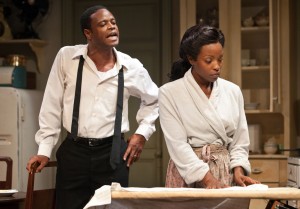A Raisin in the Sun is a win for Soulpepper and Mengesha. Again.
By Atkilt Geleta
After being touted as “a wonderfully luminous production” by the Calgary Herald for its 2008 run, Soulpepper’s A Raisin in the Sun arrived in Toronto last night looking to replicate its earlier success. It did so resoundingly.
51 years after Raisin’s first production, the motivations of characters drawn from a segregated America remain highly relevant, and more importantly, relatable across gender and race. As Charles Officer who plays Walter Younger explains, “poverty still exists, dreams still exist, family still exists, and conflict still exists.”
There is perhaps some poetic resonance in that Soulpepper’s Raisin made its Toronto debut the same day the first Muslim mayor in Canada was announced with Naheed Nenshi’s victory in Calgary – the town where Raisin had its first run. Similar to how Raisin was playing the night Obama was elected. That resonance is open to interpretation. It may be that it reflects how far we’ve progressed in the West, or that half a century later we’re still confronted with some of the same issues.
Lorraine Hansberry’s masterful work was adapted by widely acclaimed director Weyni Mengesha, who garnered attention with blood.claat and ‘da kink in my hair. With Raisin’s second run, Mengesha’s list of accomplishments continues to impress, maybe even beginning to echo Hansberry’s achievements. An unfit comparison? Maybe, but perhaps not when considering that like Hansberry she’s harvesting a sizeable amount of firsts as an Ethiopian, Ethiopian-Canadian, and Ethiopian-Canadian woman. She is only 32.
Raisin is classic Americana: the story of one family living in a rundown, claustrophobic tenement flat in Chicago’s South Side, orphaned by the patriarch, and coming into his life insurance policy. The Youngers squabble over how to invest the $10,000, each with a respective vision of the American dream.
Walter Younger Jr. has well-meaning but slightly misguided aims of establishing a liquor store business, and earning his keep as head of the household. His identity conscious sister, Beneatha Younger, aspires to use a part of the inheritance for her medical school tuition, while Walter’s expectant wife is desperate for a house for their growing family. The decision rests with grandmother Lena Younger, wife to the deceased “Big Walter” and head of the Younger household.
The play analyzes the goals and motivations of three generations of black Americans. Grandmother Lena Younger’s firm southern values collide with Walter’s increasingly fanciful entrepreneurial ambitions while sister Beneatha, the coming-of-age intellectual, adopts secular rationalist views that don’t agree with the rest of the clan. Walter’s wife Ruth stays firmly supportive of her husband, while gently attempting to sway him towards a more secure investment. The plot is set against an environment of a hostile, classist America with ever evolving forms of identity and values.
Charles Officer finely delivers as the iconic Walter Lee Younger, a role formerly occupied by Sidney Poitier and P. Diddy. He espouses the dreams and desperation of a young man at a crossroads. His anxiety translates to the audience, with each scene he enters mounting in tension.
Newcomer Bahia Watson is fantastic as Beneatha, the sassy 20-year-old student and most educated of the Youngers. Watson alluringly conveys the sister Younger’s sarcasm and frustrations at being treated like an adolescent among a family of adults. She continues to impress when her character takes a dramatic turn, after Walter decides the fate of the tuition money.
Alison Sealy-Smith’s Lena Younger is the seasoned matriarch in the play, as Sealy-Smith is of the cast. From the elderly gait, to the rich southern molasses drawl, she is spot on with her depiction of the traditionally Christian woman wrought with apprehension at losing her children to these “new ideas” that she finds so foreign. She reprises her Dora award winning take as Lena and is easily the best performer in an all around talented cast.
Abena Malika’s Ruth is understatedly precise, channeling the silent anguish of a devoted mother and wife constantly sacrificing for her family. Finally, Barbara Barnes-Hopkins turns in the comedic performance of the play as the eavesdropping neighbor Mrs. Johnson.
It was an emotionally rousing performance, and the audience reciprocated in kind with a lengthy standing ovation, and a well deserved one. Raisin deserves its hype.









[...] This post was mentioned on Twitter by Soulpepper Theatre and Nathan Kelly, SWAY Magazine. SWAY Magazine said: A Raisin in the Sun is a win for Soulpepper and Mengesha, again. http://bit.ly/c84JHH [...]
Leave your response!